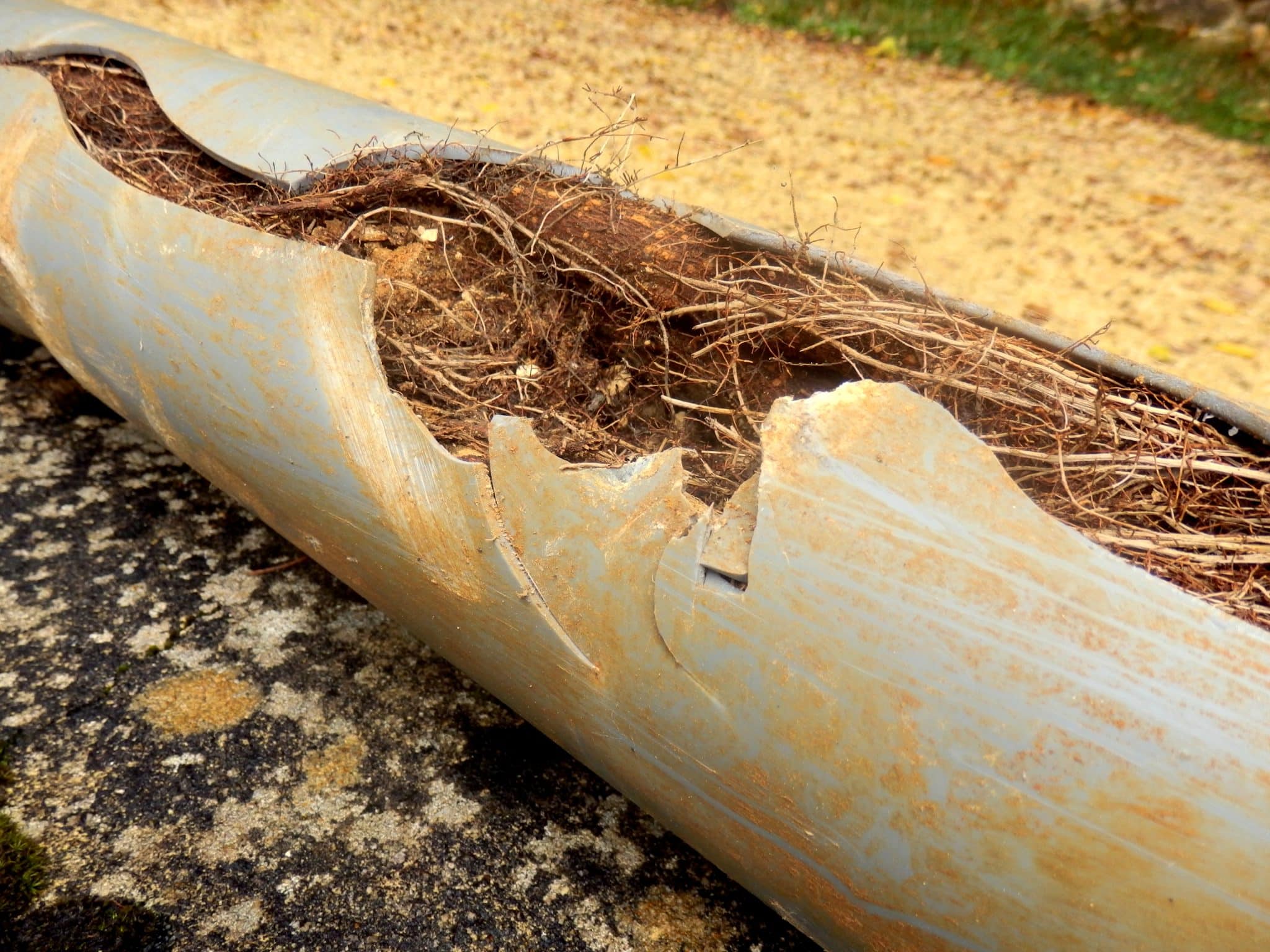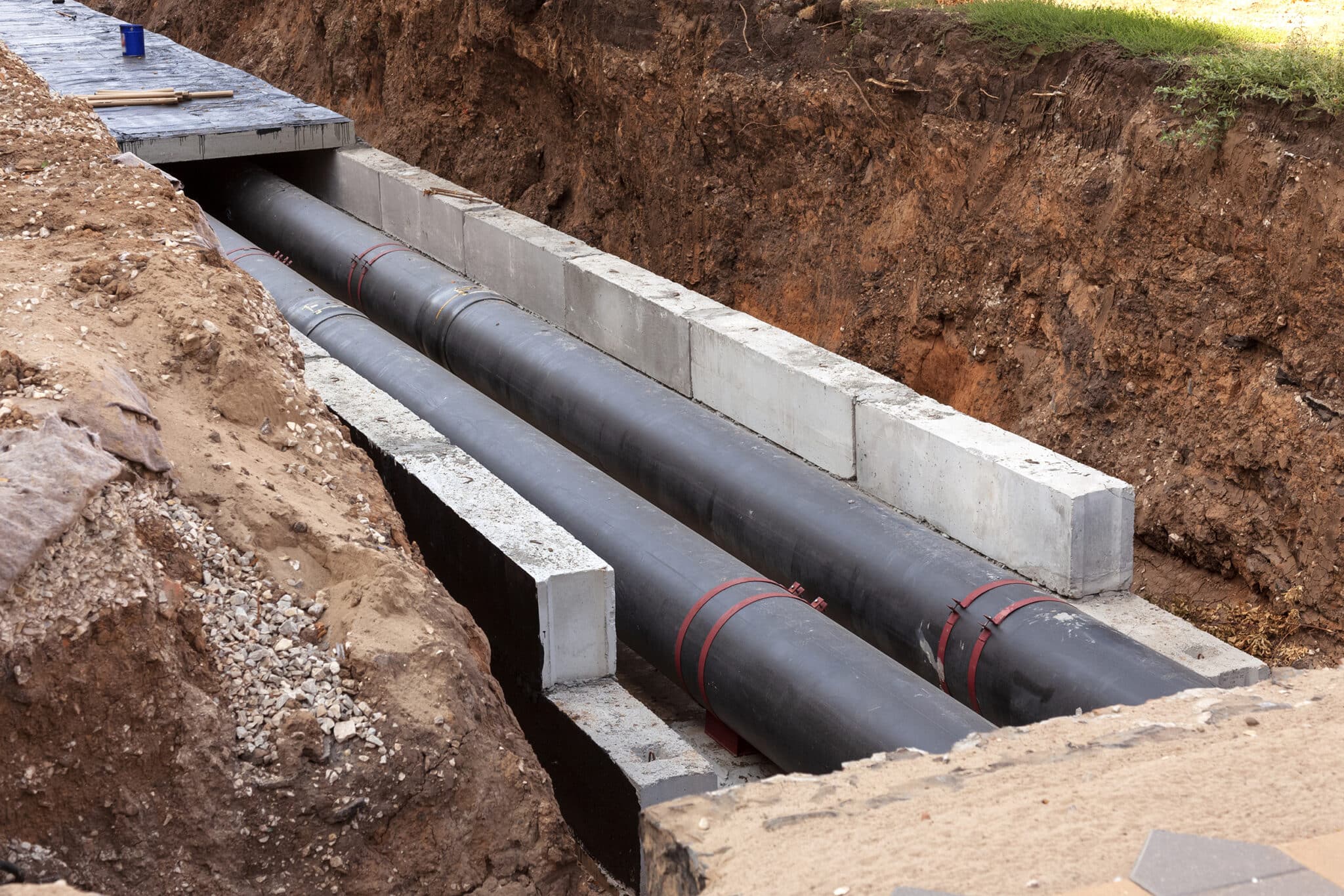Underground plumbing lines can get damaged by tree roots, shifting soil, corrosion, or old pipes. Signs of trouble include higher water bills, low water pressure, and wet spots in your yard. Leak detection tools and professional checks can find issues early and help you avoid costly repairs.
Signs Your Underground Plumbing Lines Might Be in Trouble
Hidden plumbing problems can turn into expensive disasters if you don’t catch them early.
Knowing the warning signs can help you avoid major repairs and damage to your Underground Plumbing Lines.
One big red flag is a higher water bill for no reason.
Even a tiny crack in a pipe within your Underground Plumbing Lines can waste a lot of water, making your bill jump unexpectedly.
If your water use hasn’t changed but your bill keeps climbing, it’s time to check for leaks.
Another warning sign is low water pressure.
If your faucets or showerheads suddenly lose pressure, there could be a hidden leak in your subterranean pipes messing with the water flow.
Watch out for water pooling in your yard.
If you see soggy spots or standing water with no clear cause, a broken pipe beneath the surface might be leaking under your lawn.
This is especially concerning near your main water line.
Catching leaks early can save you from headaches and costly repairs.
If something seems off, a professional leak detection service can find the issue before it gets worse.
Learn more about leak detection from Benjamin Franklin Plumbing of Richardson, TX, and protect your home from serious damage.
Common Causes of Underground Plumbing Line Damage
Tree Root Intrusion
If you have trees near your home, their roots might be invading your buried water and sewer lines.
Roots naturally search for water, and even a tiny crack in a pipe can release enough moisture to attract them.
Once they get inside, they grow, clogging pipes, increasing pressure, and sometimes even causing them to collapse.
This is a big problem in Richardson, TX, where clay soil and large trees make root intrusion more common.
Soil Shifting and Ground Movement
The ground beneath your home is always moving, and that movement can damage your subsurface plumbing system.
Seasonal weather changes, shifts in moisture levels, and even nearby construction can cause the soil to expand or contract.
When that happens, your pipes can bend, crack, or break.
In Richardson, TX, where droughts are common, dry soil can shrink and pull pipes out of alignment, creating even bigger plumbing issues over time.
Aging or Corroded Pipes
If your plumbing is more than a few decades old, it could be wearing down.
Pipes buried beneath your property, especially those made from cast iron or galvanized steel, tend to corrode and weaken over time.
This can lead to leaks, cracks, and lower water pressure.
Regular inspections and timely replacements can help prevent expensive water damage and sudden pipe failures.
How Tree Roots Can Damage Underground Plumbing Lines
Tree roots and subsurface pipes don’t mix.
When a pipe leaks, roots can sense the moisture—even from 50 feet away.
They grow toward the leak, squeezing into tiny cracks or joints.
Over time, the roots expand and cause serious damage.
How Roots Get into Pipes
Tree roots naturally seek water.
Even the smallest leak can attract them.
Once inside, they make the leak worse, creating a cycle of growth and blockage.
Cracks, Clogs, and Plumbing Trouble
As roots push deeper, they widen cracks, block water flow, and trap debris.
This can lead to slow drains, gurgling toilets, or even a complete pipe collapse.
Signs of Root Trouble
Are your drains clogging often?
Do you notice bad odors or soggy spots in your yard?
These could be signs that roots have invaded your underground plumbing lines.
A professional leak inspection can catch the problem before it turns into a costly mess.
Ignoring root damage can lead to major repairs.
If you think tree roots are harming your plumbing in Richardson, TX, Benjamin Franklin Plumbing of Dallas, TX can fix the problem before it gets worse.
How Soil Shifting Can Damage Your Underground Plumbing
Soil movement can quietly damage underground plumbing lines.
As the ground shifts, pipes can bend, crack, or even break apart.
You may not notice it at first, but over time, this can lead to expensive repairs.
One big reason this happens is foundation settling.
Here in Richardson, TX, we deal with soil that expands and shrinks because of Texas’ clay-heavy ground.
As the foundation moves, the pipes below can shift or break.
The problem gets worse when the soil dries too fast, pulling away from subsurface structures and leaving pipes with no support.
Weather changes make things worse.
Long dry spells followed by heavy rain cause the ground to shift.
Dry soil shrinks—wet soil expands.
This constant movement can push water lines out of place by as much as six inches, leading to cracks, leaks, or complete pipe failure.
To protect your underground plumbing lines, keep the soil around your foundation evenly moist with soaker hoses or smart landscaping.
Regular plumbing checks can also help catch small issues before they turn into big problems.
If you think soil movement is affecting your pipes, a professional inspection from Benjamin Franklin Plumbing of Dallas, TX can help you avoid major damage before it disrupts your home.
Corrosion and Material Breakdown in Underground Plumbing Lines
Underground plumbing lines don’t last forever.
Over time, they break down, leading to leaks, poor water quality, and even structural damage.
Catching the signs early can save you from expensive repairs.
How to Spot Rust and Decay in Pipes
If your water tastes metallic, looks discolored, or smells off, your pipes may be rusting.
Rust buildup weakens the pipe walls, making them prone to cracks and tiny leaks.
In severe cases, you might even see flaking or rust on exposed sections.
What Speeds Up Pipe Corrosion?
Certain conditions make pipes break down faster.
High water acidity, too many minerals, and constant temperature changes can wear them out.
Older pipes, especially galvanized steel or iron, rust more easily.
In Richardson, TX, shifting soil can also stress pipes, making the problem worse.
When Should You Replace Your Pipes?
Copper pipes usually last 50-70 years, while PVC can last over 100 years if conditions are right.
If your underground plumbing lines are aging and you’re dealing with frequent leaks or water quality issues, replacing them might be the smartest long-term fix.
How to Find Underground Plumbing Leaks Without Digging
Finding leaks in buried water lines without digging takes the right tools and approach.
Luckily, modern leak detection technology can spot leaks with amazing accuracy, saving you from the hassle and cost of excavation.
Using acoustic leak detection, experts can track sound changes in water flow beneath the surface and find leaks with 90% accuracy.
One easy way to check for a leak is by watching your water meter.
Turn off all water sources in your home and check the meter.
If it keeps moving, even a little, you likely have a hidden leak in your subsurface plumbing system.
Catching this early can help prevent bigger issues down the road.
Another sign to watch for is unusual noises in your pipes.
If you hear running water when no taps are on, you might have a leak.
A soft hissing or bubbling sound could also mean water is escaping from a hidden pipe beneath your property.
For a clear, accurate diagnosis, professionals use camera inspections to get a close-up look at hidden pipes without digging up your yard.
A camera inspection pinpoints problem areas quickly, so repairs can be made with minimal disruption.
Homeowners in Richardson, TX, can explore this service with Benjamin Franklin Plumbing of Dallas, TX.
Water Quality Changes That Mean Plumbing Trouble
If your tap water suddenly looks, smells, or tastes strange, don’t ignore it.
Changes in water quality usually mean there’s a problem with your underground plumbing lines.
If your water turns red, orange, or brown, your pipes could be corroding.
Old iron or steel pipes break down over time, letting rust seep into your water.
A metallic taste is another sign of corroded pipes.
Cloudy or milky water? That’s usually tiny air bubbles, often caused by pressure issues in your system.
A musty or rotten egg smell could mean sulfur or bacteria buildup, possibly from leaks or stagnant water in damaged pipes.
Also, watch for drops in water pressure.
If corrosion builds up inside pipes, water flow slows down, leaving you with weak or uneven pressure at your taps.
If you notice any of these warning signs, don’t wait.
A professional inspection of your underground plumbing lines can catch issues early, saving you from expensive repairs and possible health risks.
Sewer Line Problems That Mess with Your Plumbing
Dealing with sewer line issues is a headache no homeowner wants.
When something goes wrong with underground plumbing lines, you’ll notice problems both inside and outside your home.
One of the biggest warning signs? Constant drain backups and slow drains.
If your sinks, tubs, or toilets keep clogging, it’s probably more than just a simple blockage.
Another red flag is a nasty sewage smell.
If you catch a foul odor near drains or in your yard that won’t go away, your sewer line could be leaking.
Even your yard can hint at trouble beneath the surface.
Soggy spots, extra-green patches of grass, or sudden sinkholes could mean sewage is leaking into your soil.
Over time, that moisture can damage your foundation and cause expensive repairs.
Ignoring sewer problems won’t just cost you money—it can put your health at risk.
Sewage backups can contaminate groundwater and spread harmful bacteria.
If something seems off, don’t wait.
Call Benjamin Franklin Plumbing of Dallas, TX for a professional inspection before things get worse.
What to Do If You Think Your Underground Plumbing Is Damaged
If you think something’s wrong with your underground plumbing lines, don’t wait.
Acting fast can save you from expensive repairs.
Here’s what to do:
Check for Warning Signs
Look for signs like water pooling in your yard, higher water bills, or low water pressure.
Inside, listen for odd sounds like hissing or gurgling when no water is running.
If you notice damp floors or walls, your underground pipes might be leaking.
Call a Licensed Plumber
Even if it seems small, underground leaks can get worse fast.
A licensed plumber in Richardson, TX has the tools to find the problem without tearing up your yard.
Don’t try DIY fixes—subsurface plumbing is tricky, and a bad repair can make things worse.
Get a Professional Inspection
A plumber from Benjamin Franklin Plumbing of Dallas, TX will use high-tech leak detection tools like acoustic sensors and camera inspections to find the issue.
These methods keep digging to a minimum.
Once they find the problem, they’ll explain the best repair options.
Act Fast
Ignoring underground plumbing lines issues can lead to foundation damage, mold, and wasted water.
The sooner you handle it, the better.
If you think there’s a problem, don’t wait—schedule an inspection today.
Repair Options for Underground Plumbing Line Damage
Fixing underground pipes doesn’t have to mean tearing up your yard for days.
Thanks to modern technology, homeowners in Richardson, TX, can now choose quick, non-invasive methods to repair damaged pipes.
The best repair method depends on how bad the damage is, what the pipes are made of, and where the problem is.
Trenchless Repair vs. Traditional Digging
Old-school repairs require digging deep trenches to reach the damaged pipes, often wrecking your landscaping, driveway, or foundation.
Trenchless pipe repair avoids that mess by using smart techniques like pipe bursting and cured-in-place pipe (CIPP) lining.
This way, you keep your yard intact.
Pipe Relining and Other No-Dig Solutions
For small cracks and leaks, pipe relining is a great fix.
A tough epoxy liner is placed inside the damaged pipe, hardens, and forms a new pipe inside the old one.
This method extends the life of underground plumbing lines without digging up your yard.
If clogs or tree roots are the problem, hydro jetting blasts high-pressure water through the pipes to clear them, keeping everything flowing smoothly.
Full Pipe Replacement: When Is It Necessary?
Sometimes, a full pipe replacement is the only option—especially if pipes are badly corroded or collapsed.
If your home still has old metal or clay pipes, switching to PVC or PEX can prevent future problems and improve water flow.
A professional inspection will help determine the best solution for your underground plumbing lines.
How Regular Plumbing Maintenance Stops Underground Damage
Keeping up with regular plumbing maintenance is the best way to protect your underground plumbing lines and avoid expensive repairs.
Small problems can stay hidden until they turn into big, costly issues.
Here’s how routine care keeps your plumbing in top shape.
Catching Problems Early with Annual Inspections
Getting a yearly plumbing check-up helps find small leaks, pipe shifts, or early corrosion before they cause real damage.
In fact, inspections catch up to 93% of issues before they get serious.
Plumbers use high-tech tools like camera inspections and acoustic leak detection to check your underground system without digging up your yard.
Preventing Buildup with Regular Cleaning
Over time, mineral deposits, grease, and debris can clog up your pipes.
A routine flushing—especially in older homes—keeps water flowing smoothly and prevents blockages.
Ignoring buildup can put pressure on your pipes, leading to cracks or even bursts beneath the surface.
Fixing Small Issues Before They Get Worse
A slow drain, lower water pressure, or strange pipe noises might not seem like a big deal.
But these small signs often mean bigger trouble ahead.
Repairing tiny cracks or reinforcing weak spots before they fail helps you avoid expensive replacements or major digging.
If you think there’s a problem with your underground plumbing lines, getting it checked early can save you time and money.
The expert team at Benjamin Franklin Plumbing of Dallas, TX provides top-quality repairs and maintenance in Richardson, TX, keeping your plumbing running smoothly year-round.
FAQs
How do I know if my underground plumbing lines are leaking?
If your water bill suddenly spikes, your water pressure drops, or you notice soggy spots in your yard, you might have a leak. Also, if you hear running water when no taps are on, it’s a red flag.
Can tree roots really damage pipes?
Yes! Tree roots naturally search for water and will grow toward even tiny pipe leaks. Over time, they can get inside, crack the pipe, and cause blockages or serious damage.
What if I think there’s a leak but don’t see any signs?
If you suspect a hidden leak, check your water meter for unexplained changes, listen for hissing or bubbling sounds, or call a pro. Benjamin Franklin Plumbing of Richardson, TX, has advanced tools to find hidden leaks fast.
How often should buried plumbing be checked?
At least once a year, especially if your home is older or has big trees nearby. Regular inspections can catch small problems early before they turn into expensive repairs.
Is trenchless pipe repair better than digging?
Yes! Trenchless methods, like pipe relining and bursting, are faster, less messy, and help preserve your yard compared to traditional digging. They fix your pipes with minimal disruption.






